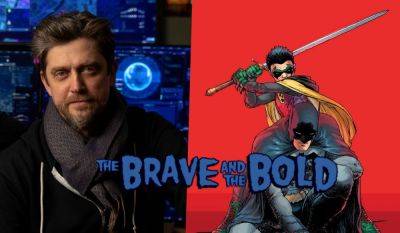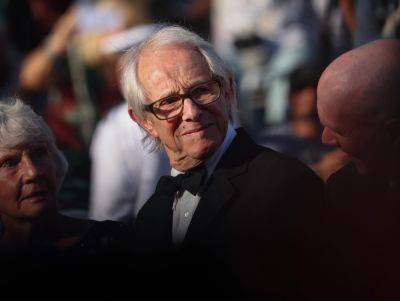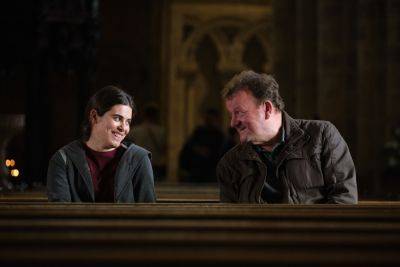Addie Morfoot Contributor Documentaries about celebrities are a dime a dozen these days. But docus about celebrities that don’t feel like infomercials and instead are raw, informative, and honest about their star subjects are few and far between. HBO Sport’s two-part docuseries “Golden Boy,” about Oscar De La Hoya, fits into the jaw-droppingly candid, no-holds-bar category.In the first three minutes of the doc, directed by Fernando Villena, the Olympic boxing gold medalist and multi-world title-winning professional boxer, who is now 50 years old, says, “Everyone thought they knew me.
‘The Old Oak’ Review: Ken Loach’s Drama Shines a Vital Light on Working-Class British Racism Until It Succumbs to Soft-Hearted Wish-Fulfillment
26.05.2023 - 21:13 / variety.com
Owen Gleiberman Chief Film Critic Tommy Joe Ballantyne (Dave Turner), the central character in Ken Loach’s “The Old Oak,” is a middle-aged landlord and proprietor of a pub that sits near the bottom of a sloped street of working-class row houses. We’re in an unnamed village in the northeast of England, and the pub, called the Old Oak, has seen better days. So has Tommy, who’s known as TJ. Dave Turner, the very good actor who plays him, resembles a bone-weary cross between John C. Reilly and Michael Moore. There’s a sweet-souled directness to his sad prole stare, and he treats his customers, some of whom he has known since they were in grade school together, with quiet affection and respect. But the pub is falling apart, and the property values in the neighborhood have plunged. TJ is barely scraping by serving pints of bitters.
In Boston, I knew a bartender at an Irish pub named Tommy who was the nicest man on earth, but when you looked into his eyes you saw a sorrow, rooted in the black Irish mist, that seemed to stretch back for generations. TJ’s stretches back at least to his father, who was a coal miner, like everyone else in town; so was TJ. The miners worked their thankless jobs in the pit, but they had each other, and they had the union. Their ability to strike, starting with the big one in 1969, gave them a sense of solidarity, even if the fight against management didn’t work out as well as it should have. But with the pits now closed down and the mining economy collapsed, the people in TJ’s pub are living on fumes. They still come in for a “friendly” pint, but the place is less “Cheers” than jeers. And part of what they’re disgruntled about is that the last thing they have left — that sense of community — is, to

‘The Brave & The Bold’: Director Andy Muschietti “Top Choice” Is The Top Choice To Tackle New DCU Batman Film
James Gunn and Peter Safran have been given the keys to the newly formed DC Studios. And the duo has already assembling the first wave of theatrical projects for the rebooted DCU, with Gunn’s “Superman: Legacy” (currently deep in the casting process) leading the charge.

PJ Harvey shares single ‘I Inside the Old I Dying’ and announces UK and European tour
PJ Harvey has shared new single ‘I Inside The Old I Dying’, as well as announcing details of a 2023 UK and European tour. See dates and ticket details below.The double Mercury Prize winner marked her return back in April with the single ‘A Child’s Question, August’ and news of her 10th album ‘I Inside The Old Year Dying’, the long-awaited follow-up to 2016’s ‘The Hope Six Demolition Project‘.Now, Harvey shares another taster of the record with what she described as “delicate and beautiful song eluded us until the very last day in the studio”.“Over the previous five weeks we had tried so many times to capture it and failed, and/but then John [Parish, producer and collaborator] reinvented the feel of the guitar pattern,” she explained.

‘The Goldbergs’ Alum Jeff Garlin Used ‘Power and Status to Intimidate and Demean’ Colleagues, New Book Claims
Jeff Garlin‘s behavior while working on The Goldbergs allegedly created a challenging environment for his colleagues.

'The Old Guard 2': 7 Original Stars Returning for Sequel, 1 Person Officially Exits, & 2 Join the Netflix Movie Cast
One of Netflix’s biggest original movies is The Old Guard, which landed on the streaming service in the middle of the pandemic in 2020.

All the Parklife 2023 road closures this weekend
With the arrival of 80,000 party-goers over the Parklife 2023 weekend, roads around the site will be closed, as well as some motorway junctions too. Here’s a rundown of the closures in full…

Jeff Garlin Was Allegedly 'Harassing, Disparaging or Physically Problematic' on 'The Goldbergs'
Jeff Garlin had a very abrupt 2021 exit from The Goldbergs.

‘The Book of Solutions’ Review: When Did the Talented Michel Gondry Become the World’s Most Annoying Filmmaker?
Owen Gleiberman Chief Film Critic If you’ve ever wondered when it was that Michel Gondry, the gifted French director of “Eternal Sunshine of the Spotless Mind,” became the world’s most annoying filmmaker, you might say the answer is, “He always was.” Yet no one, including me, quite thinks of him that way. That’s because the few works of his that have come to prominence possess a special combination of facility and charm. I adore “Eternal Sunshine,” a virtuoso movie that bends your brain and breaks your heart at the same time. You might simply choose to characterize it as the masterpiece of screenwriter Charlie Kaufman, but the truth is that Gondry directed it — the leaps in time, the emotionally convulsive performances of Jim Carrey and Kate Winslet — with a masterful sense of play and gravitational control.

Matt James' Mom In Talks to Appear on 'The Golden Bachelor'
It looks like Matt James‘ mom might be following in his footsteps!

Lewis Capaldi secures second week at the Official Albums Chart summit with Broken By Desire To Be Heavenly Sent
Lewis Capaldi reigns atop the Official Albums Chart for a second week with Broken By Desire To Be Heavenly Sent.

‘Lost’: Damon Lindelof Says He Has “Profound Regrets” In Light Of Allegations Of Racism & Sexism During Production
As the years march on, the importance of ABC’s “Lost” continues to shine through. This is a show that wasn’t the first of its kind—a serialized drama that captured the hearts and minds of viewers—but it was one of the most influential series of the past 30 years, full stop.

Welcome to the Golden Age of Oversharing
engulfing the trendy Los Angeles restaurant Horses. An assortment of things has told me, against my will, about what her and her grown-up Spy Kid husband do when they're alone together. Jameela Jamil regaling a horrified Al Roker with a tale about a .

‘The Little Mermaid’ Takes Memorial Day Weekend Box Office Crown With Splashy $117.5 Million Debut
Brent Lang Executive Editor Family audiences turned out in force, propelling Disney’s “The Little Mermaid” to the top of the box office over the Memorial Day weekend. The film, a live-action remake of the 1988 animated favorite, earned a splashy $117.5 million over the four-day holiday. It ranks as the fifth largest Memorial Day debut — last year’s “Top Gun: Maverick” set a new record for the holiday with its $160.5 million launch. At one point over the weekend, it looked as if “The Little Mermaid” might even open north of $120 million, but ticket sales flagged slightly. For Disney, the film’s popularity is a testament to its strategy of digging deep into its vaults and rebooting animated titles as live action movies, something it has done successfully with the likes of “Aladdin,” “Beauty and the Beast” and “The Lion King.” Waiting out on the horizon: Ahmir “Questlove” Thompson, the Oscar-winning director of “Summer of Soul,” is helming a remake of “The Aristocats” for Disney.

Left-Wing Director Ken Loach, Writer Paul Laverty on the Poisonous Seed-Bed for Far Right Politics in Britain’s Rust-Belt Communities
Leo Barraclough International Features Editor In “The Old Oak,” which played in Competition in Cannes, Ken Loach portrays a village in the North-East of England where the indigenous white community comes into conflict with Syrian refugees – a conflict fuelled by the despair, deprivation and decline of the rust-belt region. Such conditions can be a seed-bed for far right groups, the director tells Variety. Such issues have not been explored sufficiently in film and television, Loach says, and he draws a parallel with the portrayal of the rise of Nazism in Germany in the mass media. “We have endless programs about the Second World War, about the horrors of Nazism and fascism, about the racism, about the Holocaust. Quite properly, we have endless programs about that, but what they refuse to point out is that that arose from alienation, anger, feeling cheated, and finding scapegoats. And that’s how we ended up with Hitler, and that’s the ground in which the far right flourishes. One of the points of the film is to say: This is the cause of fascism. This is where it comes from. This is its seed-bed, and it comes as an inevitable consequence of our economic system. Because if the neoliberal agenda was an essential development for capitalism, to use the old-fashioned word, then that’s where fascism comes from. Implicit in that is that the far right will rise because that’s how people will be heading. And they know that and yet the mass media, the press, just turn their backs on that. They’ll tell us all about the horrors of Hitler. Sure. But they won’t tell us how he came to power. And that’s the huge lesson. And we see it in essence now all the time.”

Ken Loach discusses whether ‘The Old Oak’ will be his last movie
The Old Oak will be his last.Speaking at a press conference for his new movie at the Cannes Film Festival, Loach was asked by Deadline whether reports about his retirement are true.“One day at a time,” he responded. “If you get up in the morning, and you’re not in the obituary column; one day at a time.”It comes after he told The Hollywood Reporter last month that “it would be hard to do a feature film again” because “your facilities do decline.”He said: “Films take a couple of years and I’ll be nearly 90,” he said of a potential next movie.

One of the 'oldest pubs in Greater Manchester' goes on sale with an eye-watering price tag
A 17th century pub in Bury has gone on sale with an eye-watering price tag of £1 million. The Church Inn, in Birtle, understood to be one of the oldest in Greater Manchester, comes with four acres of stunning land, gardens and car parking.

Ken Loach On Whether ‘The Old Oak’ Is Really His Final Film: “One Day At A Time” – Cannes
Ken Loach still has more to say against The Man in society with his cinema, that was clear coming away from the Cannes press conference for his latest movie The Old Oak.

Ken Loach at Cannes: 'don't know' if 'The Old Oak' will be last film
By Hanna RantalaCANNES (Reuters) - Ken Loach said on Friday he does not know if "The Old Oak," the 86-year-old British director's attempt to win the Cannes Film Festival's top prize for a third time, would be his last. "Oh, I don't know, I live day by day," said Loach, who turns 87 in June. "If you read the obituary columns and you're not in them, it's a good day.

‘The Old Oak’ Review: Strength, Solidarity And Resistance In A Vital, Moving Social Parable — Cannes Film Festival
What could well be Ken Loach’s final film has as much fire and fury as his debut Poor Cow did in 1967, if we discount his pioneering TV work in the run-up. The visual style hasn’t changed a great deal in the years since, but that’s because the British movie veteran, soon to turn 87, isn’t much fussed about surfaces, it’s the inner lives of his characters that he wants to capture. In that respect, The Old Oak would make a fitting swansong, capping the recent North-East trilogy with a vital film that is clearly the work of the team behind previous Cannes Competition hits I, Daniel Blake and Sorry We Missed You.

The Partnership: Ken Loach And Paul Laverty On ‘The Old Oak’, Their Return To The North East Of England & The Chance To Make History By Winning A Third Palme D’Or
Only nine directors have ever won the Palme d’Or twice. Francis Ford Coppola did it in the ’70s with The Conversation and Apocalypse Now. Ruben Östlund joined the club last year after following The Square with Triangle of Sadness. But this year, there is a very real possibility that, at 86, Ken Loach may go above and beyond that by winning a third Palme for his new film, The Old Oak. Loach first won in 2006 with the historical Irish drama The Wind That Shakes the Barley, then doubled up in 2016 with I, Daniel Blake, a caustic study of Britain’s healthcare crisis. After that came Sorry, We Missed You, a no-less withering look at the punitive gig economy. Like the latter two films, The Old Oak is set in the North East of England and completes an unofficial trilogy, this time with a slightly more optimistic bent. Like all of Loach’s output since 1996, it was written by Paul Laverty, and the pair sat down with Damon Wise to discuss the film’s themes of humanity and social responsibility.
